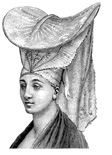
Why Was Christ a Male & Why Did He Ordain Only Men?
ON NATURE & THE ECONOMY OF GRACE
America, as I once heard her described in a college German class, is das Land der unbegrenzten Möglichkeiten, the land of unlimited possibilities. More: It is the place where you can be whoever you want to be, do whatever you like, a country freed from the shackles of “ancient prejudices and superstitions.” I begin this reflection on women’s ordination by pointing to our culture’s rejection of tradition — and traditional wisdom — in favor of the thrill of the liberation effected by what has turned out to be the acid of rationalistic individualism. We, and the cultures dominated by ours in the second half of this century, define ourselves precisely by the freedom to define ourselves: In our national psyche is the principle that we are beholden to no authority in Heaven or on earth in “molding our destiny.” “Don’t tread on me,” says the serpent.
And yet there is an order that has been placed in the world by that “Nature’s God” whom the very Founding Fathers recognized. Catholic tradition finds a great expression of this in the natural law. The consummately anti-traditional Enlightenment found great encouragement in the supposedly nontheistic Chinese tradition, yet even there the notion of a natural order, a natural law, was magnificently appreciated: “Man models himself on earth, earth on Heaven, Heaven on the Way, and the Way on that which is naturally so” (Tao Te Ching).
Yet “what is naturally so” eludes us in an increasingly man-made world, in which most of our population has been isolated from the rhythms of nature for several generations. More: We pride ourselves on our freedom from the “laws of nature.” Whether it be through the boldness of flight in which Promethean man has “defied” the laws of gravity or through the shocking mores in which ever more bizarre deviations have come to claim their place in human intercourse, we effectively believe — regardless of the creeds we utter — that we are the sole measure of all in the universe, that armed with good will and good technology we can make the lion lay down with the lamb and — why not? — allow the man to marry the man.
Thus, war has been declared on the “natural order,” for according to that order, nature is to a great extent destiny — which is no problem if nature is essentially good and created by God. But again, in our Promethean age God is the enemy, for we have declared war on all that would bind our wills, and if tradition is to be believed, God has inscribed His signature in the very nature of things. And tradition is human wisdom taking expression in a form over time. In this world at war with “what is naturally so,” every bulwark of tradition must be stormed, every fantasy of the (fallen) imagination must be enacted. It may be, of course, that this fits into God’s Providence: that “a thousand flowers bloom” and “secrets be revealed from many hearts” before the Judgment. This, at least, is consoling.
You May Also Enjoy
Could the Catholic Church end up sliding down the same slippery slope as the Anglican Communion? Yes, if certain groups get their way.
A manly man wants to do manly things -- he doesn't secretly wish to be a nursing mother. An effeminate man does!
No temporal or civilizational events can override the sacramental necessity of the Catholic priesthood’s being reserved to men.

